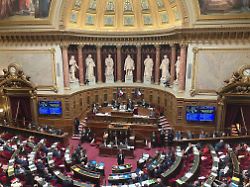Voting of local politicians
Right-wing conservatives defend majority in the Senate
September 25, 2023, 2:27 a.m
Listen to article
This audio version was artificially generated. More info | Send feedback
The French Senate is considered the voice of the regions in Paris; part of the chamber is re-elected every three years. This time, the right-wing populist Rassemblement National has managed to re-enter the party, while Macron’s Renaissance Party is not pulling any punches.
The right-wing conservative opposition defended its traditional dominance in the Senate elections in France on Sunday. With the election, the “Senate majority” of the conservatives and the center in the chamber will be “confirmed,” said Bruno Retailleau of the conservative Republicans. President Emmanuel Macron’s party, however, suffered another defeat. The right-wing populist Rassemblement National (RN), which was recently not represented in the Senate, is moving back into the parliamentary chamber.
The Republicans continue to be “by far the most important group” in the Senate, Retailleau said. The Socialists remain the second strongest group with currently 64 senators. The right-wing populist Rassemblement National won three seats: in the northernmost departments of Pas-de-Calais and Nord and in Seine-et-Marne, east of Paris.
The defeat of State Secretary Sonia Backès was emblematic of the lack of anchoring of the Renaissance presidential party. She was the only government member to run for the Senate and was defeated by the independent Robert Xowie in a runoff election in New Caledonia.
The French Senate, with its 348 seats, is considered the voice of the regions and has an important role in passing laws. Unlike the National Assembly, it is not elected directly, but indirectly through electors, who are primarily elected local councilors. Around 77,000 local and regional politicians cast their votes. This time, 170 of the 348 senators were elected in around 40 departments. The 178 others will be re-elected in 2026. The presidential party Renaissance, which was only founded in 2017 for Macron’s first presidential election campaign, has no roots in the regions and has repeatedly performed poorly in elections.
